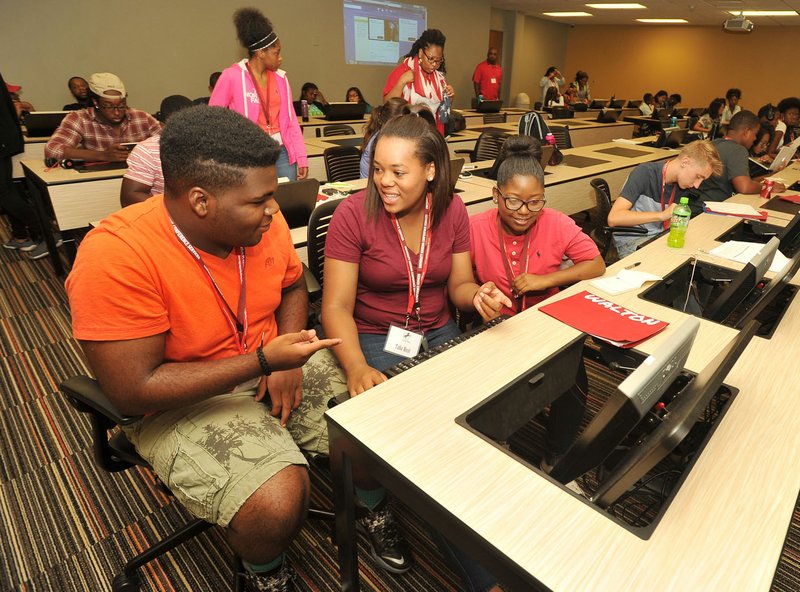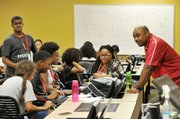FAYETTEVILLE -- To entrepreneur and financier Morton Fleischer, it's the return on investment that makes the Fleischer Scholars program worthwhile.
"I personally believe that America will never become what it could be unless we solve the problem of how do we deal with the economically disadvantaged sector of America," said Fleischer, 79, explaining why he began the Fleischer Scholars program, first at Arizona State University and then at the University of Arkansas.
This week 33 high school students attended the residential program named after Fleischer at UA. In its second year on the Fayetteville campus, the program, previously known as the Spirit Scholars program, brings together high school juniors and seniors with an interest in business or entrepreneurship.
The goal is to develop leaders, said Fleischer, chairman of Scottsdale, Ariz.-based Store Capital. He funds the program and traveled to Fayetteville to visit with participants.
"Over time, they go back in their communities and we get a multiplier effect. They become models in their communities," said Fleischer.
The program aims to enroll first-generation college students, those from low-income families, or students from underrepresented groups. Along with the summer residency program -- which has as its only cost a $25 registration fee -- UA now has begun raising money for $10,000 Fleischer Scholars renewable college scholarships that would go to in-state students.
The effort comes at a time of growth for UA's Sam M.Walton College of Business but also with the college seeing a larger share of students from outside Arkansas.
UA's total undergraduate enrollment increased by 3,132 students from 2011 to 2015, and at the same time the university's Walton College added 1,668 undergraduates, its enrollment surge greater than that of any other UA college.
But now fewer than half of Walton undergraduates are from Arkansas. Out of an enrollment of 5,432 students this past fall, 2,476, or 46 percent, were considered Arkansas residents, according to UA. Among all 22,159 UA undergraduates, 55 percent this past fall were from Arkansas.
Walton College Dean Matt Waller has said some areas of the state have low representation within UA's business college, such as the Delta region, which has a poverty rate well above the state as a whole. Waller has described the Fleischer Scholars program as a way to boost representation from those areas.
Fleischer said several years ago he got to know Arkansas business leaders such as Jim Walton and the late J.B. Hunt. It was a visit less than three years ago, however, and a friendship struck up with David Gearhart, UA's chancellor at the time, that led to the program being brought to UA, Fleischer said.
Fleischer said he invited Gearhart and Gearhart's wife, Jane, to his Montana cattle ranch. The idea to bring the program to UA then picked up steam.
"Without him it wouldn't have happened," Fleischer said of Gearhart.
Now, he said he's advising Waller on how to expand the program.
One idea is to partner with local banks to sponsor scholarship awards. UA has announced one such partnership with Signature Bank, which has committed to $30,000 annually over five years to support scholarships through the Fleischer Scholars program.
Banks not only can receive a tax deduction by sponsoring scholarships, they can also receive credit under the federal government's Community Reinvestment Act, Fleischer said. This act requires banks to take steps to serve low-to-moderate income people who live where the bank does business.
If banks fail to meet requirements, as judged by regulators, they can be barred from opening or closing bank branches, said Dory Rand, president of the Chicago-based Woodstock Institute, a nonprofit research and policy organization that has studied the Community Reinvestment Act.
Rand said she was unfamiliar with bank scholarships as a way to satisfy the federal requirement, but if such scholarships satisfy a demonstrated community need, "it very well could be eligible for CRA credit."
UA announced the awards sponsored by Signature Bank would be for students in Washington, Benton or Monroe counties, locations where the bank operates.
"I'm a financier. This is what I do professionally. I've had a whole series of companies on the New York Stock Exchange," Fleischer said.
Fleischer's business breakthrough came in the 1980s. He invested to help chain restaurants expand locations, controlling the property and then leasing the sites back to the chain owners.
He later served as a trustee for the American Enterprise Institute, a nonpartisan policy research group well known for its conservative lean and a long list of influential scholars, past and present.
He said he's now interested in expanding his Fleischer Scholars program even further, with plans to bring it to his alma mater, Washington University in St. Louis.
After speaking with students in Fayetteville, he left an impression on 17-year-old Alyssa Bradford from White Hall, a town just north of Pine Bluff.
"You really just have to get out of your comfort zone. If you stay in your comfort zone, how are you ever going to grow as a person?" said Bradford, a rising senior in high school with plans to enroll at UA, describing what she took away from Fleischer's talk.
As part of the weeklong program, students work in teams to develop a business idea. A participant in last year's program, Jordan O'Guinn, called it a "life-changing experience."
He's set to enroll at the University of Arkansas at Pine Bluff with plans to study data analytics. His career goal is to start his own firm.
The program "really geared my mind towards business more than it was gong into the camp," O'Guinn said.
Part of the camp involves hearing from entrepreneurs. This year, students heard several discuss their own experiences, including Sam Barnes Jr., co-owner and chief executive officer for Exclusive Clothiers, a clothing business in Rogers.
"You motivated me," Bradford told Barnes after hearing him talk about the importance of taking on challenges despite uncertainty.
Barnes spoke about growing up in the small town of Altheimer, northeast of Pine Bluff, motivated by a fear of being unable to reach his dreams.
"If you're afraid to fail, then you won't be successful as an entrepreneur," Barnes told the group.
Fleischer talked about how it can make a difference in Arkansas.
"What we need in the state of Arkansas is a paradigm shift. If the community gets behind this, it'll become a reality and over a period of years, you will change the face of Arkansas economically," he said.
NW News on 07/16/2016

